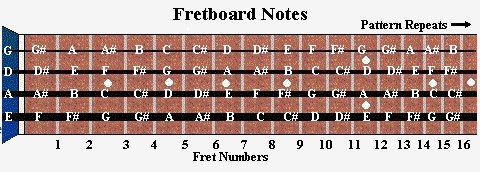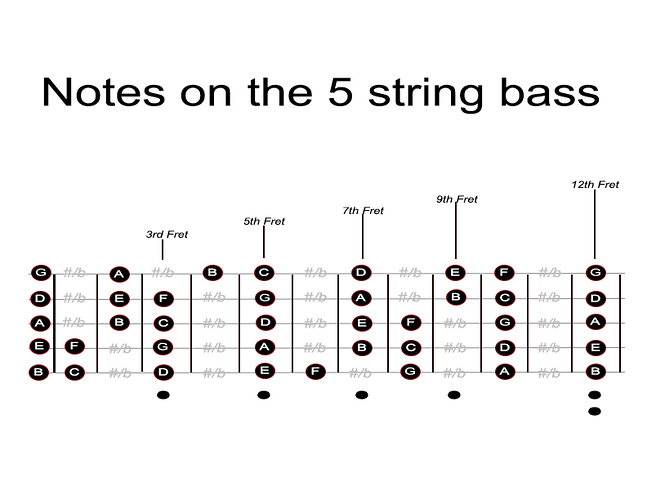I at module 6, lesson 3 and there has been a lot of emphasis lately on memorizing some notes on the fretboard. It is my goal, as soon as possible, to be able to randomly select any string and fret on the board and know exactly what note that is instantly. I feel that this is super important. What exercises can I do to make this happen? Is there more emphasis on this later on? Thank you.
I don’t.
![]()
Just my opinion but I’m not so sure that “memorization” of the fretboard is as important to learn as “relational familiarization” is…
What I mean is by this is knowing what sounds are the result of playing either open or fretted strings in relationship to each other. Having an understanding as to where certain notes are located is very helpful when knowing what key to play in and all, but knowing the relationships of sounds to locations on the fretboard is kinda how I’ve always played both guitar and bass, and I could always figure out the notes name if I need to, but for me, knowing what the names of the notes that I’m playing isn’t nearly as important as knowing sound structure to music - but then again, we all learn and play differently so what ever floats your boat I say…
yeah, in my opinion it’s more a question of shapes and intervals. and hopefully knowing/feeling what shapes and intervals will work in a given situation 
@terb and @Lanny both have a lot of experience and they’re probably right. I don’t have nearly their experience and I’m probably wrong, but I do have the same drive to have the fretboard memorized.
For me, I think it has more to do with looking at all the things I can’t do and thinking, "well, at least I can memorize the fretboard. I figure as my skills increase in other areas, I probably won’t worry about it so much. Just being confident in what I have memorized and knowing how to find the notes I don’t have memorized.
If you already have the stuff memorized from the course (open strings, using octaves to find notes, memorizing the E, A, and D string notes at frets 3, 5, and 7, understanding the B/C, E/F relationship, and being able to say A-G both backward and forward) then you can find the notes when you need them.
I hate doing rote memorization. I need context to cement things in my memory. So what I do is take the time to learn the notes for whatever I’m playing in addition to learning the tablature. That way, with each new song I’m memorizing more of the fretboard.
If you want more, take a look at this thread… I really thought I was doing something! They are talking about a lot of different relationships between notes on the fretboard.
+1 - I feel like I should, but I don’t think it is remotely urgent. I can find or tell you what any note on the fretboard is, but it might take me a moment, and that’s good enough for now. 
Cool thread - and very interesting to see how people approach this differently. I think I also work more in shapes and relations, and I wished I would be more able to instantly declare a certain string/fret to be this or that note, or, inversely, find instantly all D#s on the fretboard…
So, I guess, I would advocate for a good middle way between fully memorizing all notes, and only using shapes and relations.
I think @JoshFossgreen has a video where he advocates for being very familiar with the notes on the first five frets (on all strings)… I think he calls them “money notes”… I think…
Anyway, playing along songs while looking at the chords, and thus only trying to hit the roots in the first instance (but in real time), has helped me a lot getting quite good in the first five frets region. Above the fifth, it gets hazy…
Finally: you can turn this into a game for yourself: 1) hit any note on your bass and try to identify it (and make it competitive by trying to be faster next time); 2) try to find all F#s (etc) on your fretboard (also here, make it into a competition with yourself to always beat your personal best) - you get the idea! No gizmos or programs needed 
Memorizing the fretboard (I refer to it as “Familiarizing”) takes time and practice, no matter which method you use. The more you play and are forced to locate notes on the fretboard, the easier it becomes to instinctively finger them.
As I pointed out in another thread, I memorized (and drilled myself) on the location of all the Cs and Fs on the fretboard, and it then became easy to find all the neighboring notes. But again, it didn’t happen overnight.
I verbalize the notes as I practice my scales. This way I get lots of practice and repetition and makes scale patterns more meaingful.
@RemoteOutpost -
First up - there’s a great thread about this right over here:
As for my thoughts: I think it’s super important but only at a time where this information is expected of you.
Importance is directly related to application.
If in your playing and practice you are being asked to randomly identify and find notes all over your bass, yes - it is important.
If in your experience and practice you are expected to learn and play songs and chord progressions, it is important to learn and identify those chords.
This type of applied practice (learning chords to songs, song after song after song) has the cumulative effect of learning the entire fretboard, and it happens in an applied way.
That’s my preferred method - but the thread I linked to has other ideas as well.
You’ll regret this when I show up at your front door for a POP QUIZ! ![]()
Good distinction, Lanny. The thing is, they’re both super important. You can’t have the relational version only, because you need the memorization component to get you started any time you’re not in a flow, which could happen many times in a song depending.
I think any high-level pro bassist with good technical skills can almost instantly name any note, anywhere on the neck. Of course, you can get away with less if you don’t have super ambitious technical goals, but if you want to play beyond the basics, lightning-fast fretboard recognition is part of the picture, and it does require memorization.
Which is basically what Gio said, I’m now seeing!
This makes a lot of sense to me, thanks! Being new to the bass I have a lot of insecurities about what I need to do or not to do to get on the right path to realize my goals. I am super excited to have find this the bass buzz course because I feel like it’s giving me a great foundation to build upon.
![]()
Can’t argue with you there @JoshFossgreen!! Thing is, my memorization style focus’s more towards sound/tone familiarization in relationship to where that sound/tone is found on the fretboard.
When I think of ‘memorization’, I go back to my 1961 third grade class with Sister Irene at Saint Peter & Paul Catholic School when she was teaching the “Times Tables” in math class… All I can remember was that metal edge ruler that use to smack me up side the head with every time I missed an answer… As a result, I ended up learning them damn tables by singing them - I had no idea what they meant, how the hell they worked, why I needed to learn 'em, how I’d ever use 'em, or anything that made any sense to me at the time,… but as long as I could sing them, I’d do just fine… and avoid the wrath of Sister Irene and that damn blood stricken, metal edged 'Battle-Ax" that she proudly displayed as her distinctive weapon of choice over a class full of eight year old snot nose juvenile delinquents…
Fast forward to 2019… At 67 I really don’t wanna be a ‘high level pro’ anything (been there - done that)…![]()
![]() Also, for me to spend time ‘memorizing’ the names of the notes on the fretboard would take forever for me (I’m retired and in this for fun) and wouldn’t leave me any time to learn to play actual songs like… “Billie Jean”…, And since I’m dyslexic as hell, anything I try to learn without an actual relationship to something (other than numbers and letters which I get mixed up all the time) is about as impossible as trying to learn Mandarin Chinese Trigonometry from an eight fingered (that’s five on one hand and three on the other - obviously a former student of Sister Irene) Good 'Ol Boy Redneck from Bro’sville, Georgia…
Also, for me to spend time ‘memorizing’ the names of the notes on the fretboard would take forever for me (I’m retired and in this for fun) and wouldn’t leave me any time to learn to play actual songs like… “Billie Jean”…, And since I’m dyslexic as hell, anything I try to learn without an actual relationship to something (other than numbers and letters which I get mixed up all the time) is about as impossible as trying to learn Mandarin Chinese Trigonometry from an eight fingered (that’s five on one hand and three on the other - obviously a former student of Sister Irene) Good 'Ol Boy Redneck from Bro’sville, Georgia… ![]()
![]()
Now that’s not saying that I can’t find the notes I need to find on the fretboard… Can anyone rattle them off rapid fire and have me show you where they’re at on the fretboard?? Hell no… Don’t need to… (unless I was in Sister Irene’s Music Class)… Play the note and it’s a bit different though…
I guess in a way I have in fact memorized the fretboard - just in my own way without putting focus on the actual task of… “Formal Memorization”… Thus, resulting in the avoidance of the wrath of Sister Irene’s metal edge ruler,… “The Battle-Ax”… Or the wrath of @JoshFossgreen’s light saber,… “The Beat-Ruler”!!
You’re a GREAT teacher dude!! Way better than Sister Irene!!![]()
![]()
Keep on Humpin’ Thumpin’ and Kickin’ Ass!!
Lanny
I don’t know if anyone would be interested in this, but I made this in Photoshop when I first started playing the 5 string bass six months ago. It has helped me immensely as a study tool to learn the fret board.
Obviously, if you play a 4 string, you wouldn’t have the B string, but you can just ignore that string and focus on learning the EADG strings.
The important thing for me, was learning the sequence of the notes on each fret, which are always the same regardless of the fret. Every string that you move up on the same fret is equivalent to 5 frets (C to F = 5 frets). The notes up the fret all follow the same pattern, C,F, Bb, Eb, Ab, Db, Gb, B,E,A,D,G: and back to C.
I hope this helps a few people. It sure has helped me.
Oh, and I didn’t mention… please feel free to download the image if you want. I would be thrilled if it helps you.
Ignore the poor B string, I think this is the best advert for a 5 string that I’ve seen Pam , I just need to sell it to my darling spouse.
I think this graphic is very helpful.
Here is one for a four-string bass. It is a screenshot from some Learn Bass website I don’t remember:


